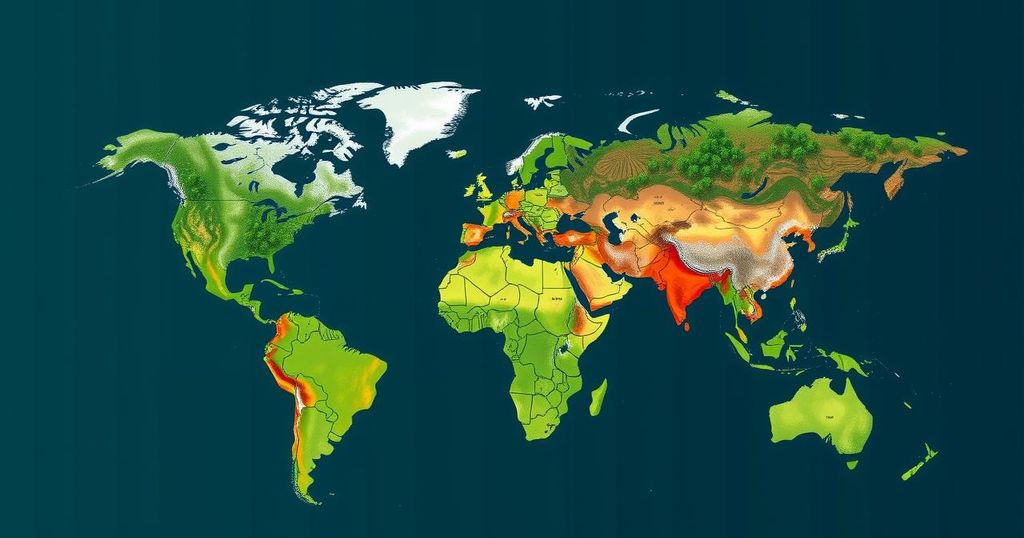Developing nations are suffering the severe impacts of climate change despite being disproportionately low contributors to greenhouse gas emissions. The COP29 climate talks in Baku highlight the urgent need for equitable climate finance discussions, particularly the issue of loss and damage. Wealthy nations have historically contributed the most to climate change and must be held accountable. The upcoming negotiations will determine how effectively these challenges can be addressed as developing countries push for adequate funding and support.
The impact of climate change has disproportionately affected developing nations, despite their minimal contribution to global greenhouse gas emissions. Historically, regions such as North America and Europe have been the primary culprits, responsible for 60% of emissions, enriching themselves while leaving the Global South to bear the brunt of climate-related disasters. In Baku, Azerbaijan, leaders congregate for the COP29 climate talks, which will address the urgent issue of climate finance and outline responsibilities for loss and damage caused by climate change. With developing nations advocating for more substantial funding, it remains uncertain how much progress will be made amid ongoing challenges and historical reluctance from wealthier countries to accept liability for environmental harm. The ongoing discussions about climate justice highlight a crucial divergence in the responsibilities of wealthier nations compared to developing countries. For years, nations in the Global North have exploited fossil fuels, leading to climate change, while the marginalized communities in the Global South have paid dearly for their environmental consequences. The call for the application of the principle of ‘common but differentiated responsibilities’ suggests that efforts to mitigate and adapt to climate change must consider each nation’s contribution to the crisis, particularly emphasizing how wealthier countries should take more initiative. As countries prepare for the COP29 talks, the proposed Loss and Damage Fund has been a focal point of contention, reflecting the pressing need for a more equitable approach to climate finance. Developing nations have emphasized that their economic growth and development are already hampered by climate change impacts, which divert crucial resources away from essential services like healthcare, education, and infrastructure. The stark reality is that less developed regions are compelled to allocate larger portions of their budgets towards disaster recovery and resilience rather than investing in sustainable development. The historical context of climate negotiations suggests that while commitments have been made to channel $100 billion annually towards climate initiatives, inadequate funding has historically surfaced for adaptation and mitigation projects. This year, the scale of funding can determine not only the effectiveness of climate action in developing countries but also the broader trajectory of the international community’s response to the climate crisis. There is widespread acknowledgement that financial support must be delivered as grants rather than loans, thus alleviating the additional burden of debt that often accompanies international assistance for vulnerable nations experiencing climate-driven challenges. As discussions unfold, there are hopes that the conversations surrounding climate finance and adaptation strategies will gain increased attention, and that the call for reparative funding will resonate with delegates. However, history suggests that substantial shifts in policy framework or financial allocations will require sustained advocacy and international pressure. Only through collective commitment can the injustice faced by developing nations be addressed effectively as part of the global climate action agenda.
The issue of climate change has become one of the most pressing global challenges, with its effects felt across various nations; however, the burden is not shared equally. Developing nations, which have historically contributed a fraction of global emissions, are suffering disproportionately from climate change impacts. The COP climate talks represent a crucial platform for addressing these inequalities, determining how climate finance should be structured, and resolving the complex issues surrounding loss and damage caused by climate-related disasters. The disparity in emissions and economic resources underscores the urgent need for equitable solutions to support sustainable development in vulnerable regions.
The COP29 climate talks stand as a critical juncture for addressing climate injustice and the financial needs of developing nations grappling with the severe consequences of climate change. As global leaders convene, the focus on equitable funding mechanisms signals an opportunity to hold wealthier countries accountable for their historical contributions to greenhouse gas emissions. It is imperative to ensure that financial support aligns more closely with the extensive damages faced by these nations, as failure to act appropriately could result in exacerbating existing inequalities and undermining global climate targets.
Original Source: theconversation.com






